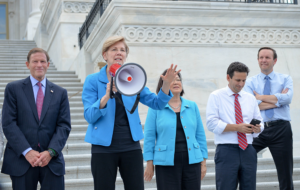Presidential candidate and U.S. Senator Elizabeth Warren (D-Mass.) supported statehood for Washington, D.C., in a tweet calling on followers to sign her petition to make D.C. the fifty-first state Jan. 28.
Warren’s petition for D.C. statehood comes on the heels of her Dec. 31 launch of her presidential exploratory committee and amid a strong push from local politicians to increase autonomy for the District.
Warren’s support for D.C. statehood, however, is not a new development. Warren co-sponsored legislation aimed toward achieving D.C. statehood in 2014, 2015 and 2017.

Residents of the District are a significant disenfranchised population, Warren wrote in a tweet.
“700,000 people is more than the populations of Wyoming or Vermont. But DC residents don’t have an equal voice in our government – despite paying federal taxes,” Warren tweeted.
Washington, D.C., operates as a district under federal jurisdiction rather than as a traditionally represented state. D.C. voters regularly participate in mayoral and city council elections and elect a delegate to the U.S. House of Representatives. The delegate can only participate in procedural votes, however, and cannot vote on the House floor.
Eleanor Holmes Norton, D.C.’s delegate to the House, introduced a D.C. statehood bill H.R. 51, the D.C. Admission Act, to the 116th Congress on Jan. 3. The bill has gained more support than previous statehood efforts, and currently has 194 cosponsors in the House, all of whom are Democrats.
Norton announced the bill in a joint press conference Jan. 4 with D.C. Mayor Muriel Bowser, who is an active proponent of statehood for D.C. Bowser frequently cites the nearly 80 percent of D.C. voters who supported a 2016 D.C. ballot advisory referendum in favor of statehood. Norton’s bill is part of a series of bills called “Free and Equal D.C.” that aim to increase the District’s independence and seek statehood.
However, because D.C. votes overwhelmingly Democratic in presidential elections, support for D.C. statehood tends to track closely with political party affiliation, according to Hans Noel, a professor of government at Georgetown, whose research focuses on political parties, polarization and ideology.
“Completely separate from any sort of merits of whether or not D.C. should be a state, the partisan division has been pretty clear for some time now,” Noel said in an interview The Hoya.
Warren’s endorsement of D.C. statehood makes sense because of its large popularity among Democratic voters, Noel said. He sees D.C. statehood as a likely point of consensus among Democratic presidential primary candidates.
“A lot of Democrats have long thought that this would be a great idea to address what Democrats see as in imbalance in the Senate over representing rural states. Republicans have likewise been opposed because they see it as a way of giving extra votes to the Democrats,” Noel said.
The issue fits as a component of the larger narrative Democrats are crafting about voting rights and voter disenfranchisement, according to Noel.
“It’s a very different issue technically from, say, voter ID laws, but they’re both very similar in they let us get more representation and worry about the folks that are disenfranchised,” Noel said. “It’s hard to make a really good case against representation of people who are Americans and should be able to vote.”
Discussion of D.C. statehood and even representation within American territories ought to be encouraged, Georgetown College Democrats Chair Rebecca Hollister (COL ’20) wrote in an email to The Hoya.
“Everyone always says DC Statehood is ‘never going to happen,’ but that is only true as long as no one is talking about it,” Hollister wrote. “I’m very pleased to see big-name candidates discussing this issue and hope that it continues.”
Navigating the constitutional requirements for bringing a new state into the union and changing the District’s representation and role are complicated legal questions, and it may be a long time before efforts surrounding D.C. statehood culminate into actual policy change, according to Noel.
“There may well be progress on it, but it’s an uphill fight for Democrats and for the district,” Noel said.




















